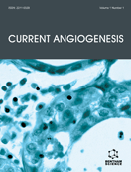Abstract
Ovarian cancer has a poor prognosis even after a complete resection and a platinum adjuvant chemotherapy because of its high rate of relapses. Clinical research has shown the role of angiogenesis in the development and progression of ovarian carcinoma. Several factors are involved, specially the VEGF. Bevacizumab is a humanized anti-VEGF antibody that was approved by the European Medicines Agency in first line for the treatments of advanced epithelial ovarian cancer, fallopian tube cancer and primary peritoneal cancer. It has to be combined with carboplatin and paclitaxel followed by maintenance therapy with bevacizumab alone. Bevacizumab has also been approved by EMA for the treatment of platinum-sensitive ovarian cancer recurrence in combination with carboplatin and gemcitabine. This literature review aims to provide updates about angiogenesis in ovarian cancer, pro-and anti-angiogenic factors that regulate angiogenesis, and lists new anti-angiogenic therapies in different phases of clinical development that aim to improve survival in patients with ovarian cancer.
Keywords: Angiogenesis, anti-angiogenic therapies, bevacizumab, ovarian cancer, VEGF.
Graphical Abstract
 20
20

